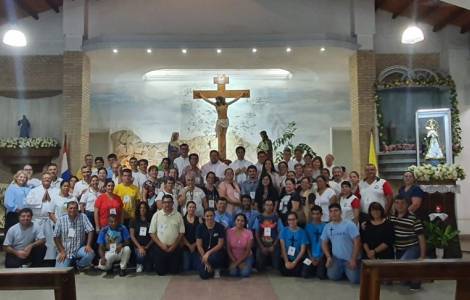
Caacupé (Agenzia Fides) - "According to their baptismal identity, the laity assume the commitment to be authentic Christians, so that in every social, political, economic, ecclesial reality ... they can embody values and highlight virtues that contribute to communion, to dialogue and participation". Likewise, it is the commitment of all the laity to establish the "Kingdom of God and his justice" in our society, being "salt and light" of the earth, "witnesses of the Gospel", to be compassionate Samaritans in our time and in our culture, for ecclesial and social transformation. Finally, the laity are called to contribute to the sanctification of the world.
These are some of the considerations that emerged from the meeting which, under the sign of the Year of the Laity that the Church of Paraguay has just experienced (see Fides, 19/11/2021; 22/11/2021), brought together on 25 and 26 March, in Caacupé the National Coordination of the Laity of Paraguay. Lay representatives of dioceses, movements, groups and ecclesial communities were present in the National Shrine, accompanied by the Bishop of Caacupé, Monsignor Ricardo Valenzuela, the Bishop in charge of the Pastoral Care of the laity, Monsignor Celestino Ocampo, and the diocesan advisor, Father Heriberto Fernandez.
The central themes of the meeting were "Identity, spirituality, mission and apostolate of the laity" and the message of Pope Francis on "The co-responsibility of the laity in the mission", deepened with the reflection directed by the laity Genaro Fernández and Eudelio Cardozo and by Bishop Celestino Ocampo. According to the information disseminated by the Episcopal Conference, since the laity are called to contribute to the sanctification of the world, reflection was made on the works of the laity in the temporal sphere. Other elements refer to the promotion of the person and human dignity, equality between them; the defense and promotion of religious freedom, freedom of conscience and freedom of worship; commitment to political life and economic and social development; the union of efforts to restore peace in the world and contribute to the development of human culture.
Following the methodology used in the continental phase of the Synod, there was a dialogue on "how to give witness to life in the different environments we frequent: at work or in the work environment, in education, in the family, in relation to health, the distribution and management of land and the housing system".
And along with this, on "how to be a prophet, priest and king in the current context and what we feel called to". Listening to the lived experiences, the need for a coherent life emerged: "assuming the commitment and honoring it, proclaiming and denouncing". In addition, it is necessary to train for service, to make our talents available.
A third aspect recalls the reality of incorporation into Christ through Baptism, "to bear witness to Him, being priests, prophets and kings in different environments, starting with one's own family, to project oneself in society as good citizens". In this sense, solidarity
was highlighted for dealing with situations such as the pandemic and to engage in social initiatives to help the underprivileged (indigenous, peasants, etc.), those who fight against the corrupt system of land distribution and other life threatening situations, such as abortion and euthanasia.
The meeting concluded with the Holy Mass in which Monsignor Celestino Ocampo invited the laity to bear witness and coherence of life in different spheres, to allow themselves to be challenged by the Word of God, not to be complicit in injustice and corruption, to proclaim Christ by being merciful to the most vulnerable, to live Holy Week. Then he invited us, looking at the Cross, to think that Jesus asks each one of us: "for whom or for what is it worth giving one's life? How could we make concrete today the expression 'love to the end?'." (SL) (Agenzia Fides, 1/4/2023)
